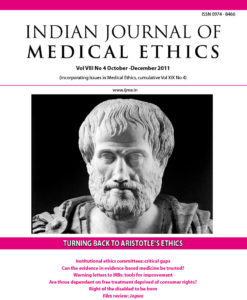
Are our efforts to be ethical hampered by a myopic vision? Does ethical behaviour mean doing what is permissible, or what is good? Such questions are rarely asked as most of us take ethics as a given. A comment in this issue argues for a fresh emphasis on the philosophy of virtue ethics, going beyond the framework of Principlism, and suggests a combined approach for greater effectiveness. This need for a broader vision is also felt by young physicians in a tribal setting, faced with a challenge to their own sense of ethical duty. A commentator analyses the responsibility of the care giver in such a situation, and suggests that there is a need to step off the beaten track and into the patient’s worldview.
Two authors look critically at common assumptions – that a disabled child should be prevented from being born, or that patients receiving free treatment have no rights as consumers – and make us question them. Another expresses his doubts about the ethical value of modern teaching tools. Yet another comments on the ethical considerations related to influenza pandemic planning and response during the influenza A H1N1virus pandemic.
Getting down to brass tacks, we have a group of researchers looking at features of the regulatory systems for monitoring clinical research bodies in the US; while another group studies the compliance of ethics committees with the official guidelines. An article analyses ethical issues in the design and implementation of public health interventions.
Finally, is research being derailed both by vested interests and a lack of clarity? One of our editorials exposes some serious lacunae in the formation and conduct of institutional ethics committees, which could completely negate the purpose of their existence. Another explores the numerous frightening ways in which the evidence provided by clinical trials can be distorted, and calls upon the scientific community to reclaim the research agenda.
